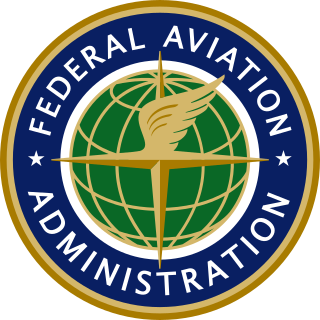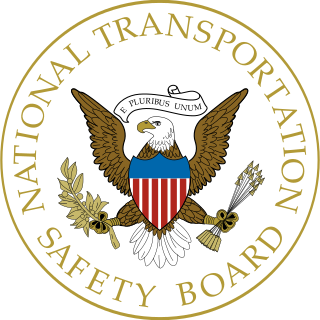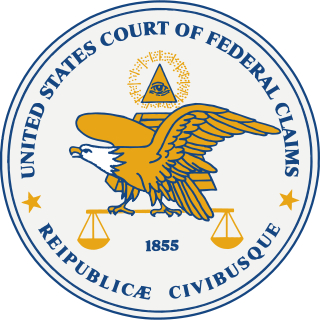Related Research Articles
Arbitration, in the context of the law of the United States, is a form of alternative dispute resolution. Specifically, arbitration is an alternative to litigation through which the parties to a dispute agree to submit their respective evidence and legal arguments to a neutral third party for resolution. In practice arbitration is generally used as a substitute for litigation, particularly when the judicial process is perceived as too slow, expensive or biased. In some contexts, an arbitrator may be described as an umpire.

The Federal Aviation Administration (FAA) is the largest transportation agency of the U.S. government and regulates all aspects of civil aviation in the country as well as over surrounding international waters. Its powers include air traffic control, certification of personnel and aircraft, setting standards for airports, and protection of U.S. assets during the launch or re-entry of commercial space vehicles. Powers over neighboring international waters were delegated to the FAA by authority of the International Civil Aviation Organization.

The National Transportation Safety Board (NTSB) is an independent U.S. government investigative agency responsible for civil transportation accident investigation. In this role, the NTSB investigates and reports on aviation accidents and incidents, certain types of highway crashes, ship and marine accidents, pipeline incidents, bridge failures, and railroad accidents. The NTSB is also in charge of investigating cases of hazardous materials releases that occur during transportation. The agency is based in Washington, D.C. It has four regional offices, located in Anchorage, Alaska; Denver, Colorado; Ashburn, Virginia; and Seattle, Washington. The agency also operates a national training center at its Ashburn facility.
Lockheed Martin Transportation and Security Solutions (LMTSS) is a Lockheed Martin business unit, formed of the combination of Lockheed Martin's Air Traffic Management (LMATM) unit with several other Systems Integration business units. LMTSS concentrates on Air Traffic Management and security-centric programs that involve large scale systems integration and transformational solutions.

The United States Court of Federal Claims is a United States federal court that hears monetary claims against the U.S. government. It was established by statute in 1982 as the United States Claims Court, and took its current name in 1992. The court is the successor to trial division of the United States Court of Claims, which was established in 1855.

The United States Arbitration Act, more commonly referred to as the Federal Arbitration Act or FAA, is an act of Congress that provides for judicial facilitation of private dispute resolution through arbitration. It applies in both state courts and federal courts, as was held in Southland Corp. v. Keating. It applies in all contracts, excluding contracts of seamen, railroad employees, or any other class of workers involved in foreign or interstate commerce, and it is predicated on an exercise of the Commerce Clause powers granted to Congress in the U.S. Constitution.

The National Air Traffic Controllers Association (NATCA) is a labor union in the United States. It is affiliated with the AFL–CIO, and is the exclusive bargaining representative for air traffic controllers employed by the Federal Aviation Administration (FAA). It also represents a range of workers related to the air traffic control (ATC) industry, and the FAA itself.
The Civilian Board of Contract Appeals (CBCA) is an Article I court that was established under the Contract Disputes Act of 1978 as an independent tribunal to hear and decide contract disputes between Government contractors and the General Services Administration (GSA) and other civilian Executive agencies of the United States.

Arbitration is a form of alternative dispute resolution (ADR) that resolves disputes outside the judiciary courts. The dispute will be decided by one or more persons, which renders the 'arbitration award'. An arbitration decision or award is legally binding on both sides and enforceable in the courts, unless all parties stipulate that the arbitration process and decision are non-binding.
Andrew Bart Steinberg was a leading aviation regulatory lawyer, who held several key posts in the public and private sectors in the United States. He served until 2008 as the Assistant Secretary for Aviation and International Affairs within the United States Department of Transportation, after being confirmed to the position by the U.S. Senate on September 29, 2006, following appointment by President George W. Bush. Prior to that post, he had been appointed by the President in May 2003, as the Chief Counsel of the Federal Aviation Administration, where he served as the top legal advisor to FAA Administrator Marion C. Blakey. Steinberg was a partner in the Washington D.C. office of the international law firm of Jones Day, where he led the firm's aviation regulatory practice, a post once held by aviation pioneer L. Welch Pogue.
Alternative dispute resolution (ADR), or external dispute resolution (EDR), typically denotes a wide range of dispute resolution processes and techniques that parties can use to settle disputes with the help of a third party. They are used for disagreeing parties who cannot come to an agreement short of litigation. However, ADR is also increasingly being adopted as a tool to help settle disputes within the court system.
Mike Monroney Aeronautical Center is a regional office of the United States Federal Aviation Administration on the grounds of Will Rogers Airport in Oklahoma City. With around 7,500 direct federal employees, the Aeronautical Center is one of the Department of Transportation's largest facilities outside the Washington, DC area, and one of the 10 largest employers in the Oklahoma City metropolitan area. It is named for Senator Mike Monroney of Oklahoma, who wrote and sponsored the Federal Aviation Act of 1958.
Southland Corp. v. Keating, 465 U.S. 1 (1984), is a United States Supreme Court decision concerning arbitration. It was originally brought by 7-Eleven franchisees in California state courts, alleging breach of contract by the chain's then parent corporation. Southland pointed to the arbitration clauses in their franchise agreements and said it required disputes to be resolved that way; the franchisees cited state franchising law voiding any clause in an agreement that required franchisees to waive their rights under that law. A 7-2 majority held that the Federal Arbitration Act (FAA) applied to contracts executed under state law.
Moses H. Cone Memorial Hospital v. Mercury Construction Corp., 460 U.S. 1 (1983), commonly cited as Moses Cone or Cone Hospital, is a United States Supreme Court decision concerning civil procedure, specifically the abstention doctrine, as it applies to enforcing an arbitration clause in a diversity case. By a 6–3 margin, the justices resolved a complicated construction dispute by ruling that a North Carolina hospital had to arbitrate a claim against the Alabama-based company it had hired to build a new wing, even though it meant that it could not consolidate it with ongoing litigation it had brought in state court against the contractor and architect.
United States Arbitration Association (USADR) is an alternative dispute resolution organization headquartered in Denver, Colorado. USADR offers mediation to parties who have filed for arbitration through USADR's national forum.
Federal Aviation Administration v. Cooper, 566 U.S. 284 (2012), was a United States Supreme Court case in which the Court held that "actual damages" under the Privacy Act of 1974 is not clear enough to allow damages for suits for mental and emotional distress. The reasoning behind this is that the United States Congress, when authorizing suit against the government, must be clear in waiving the government's sovereign immunity.
The Acquisition Management System (AMS) provides policy and guidance on lifecycle acquisition management by the United States Federal Aviation Administration (FAA). The self-stated objectives of the AMS "are to increase the quality, reduce the time, manage the risk, and minimize the cost of delivering safe and secure services to the aviation community and flying public." The AMS applies to acquisitions by the FAA in place of the Federal Acquisition Regulation (FAR) and various other provisions of Federal acquisition law.
Epic Systems Corp. v. Lewis, 584 U.S. ___ (2018), was a case decided by the Supreme Court of the United States on how two federal laws, the National Labor Relations Act (NLRA) and the Federal Arbitration Act (FAA), relate to whether employment contracts can legally bar employees from collective arbitration. The Supreme Court had consolidated three cases, Epic Systems Corp. v Lewis, Ernst & Young LLP v. Morris (16-300), and National Labor Relations Board v. Murphy Oil USA, Inc. (16-307). In a 5–4 decision issued in May 2018, the Court ruled that arbitration agreements requiring individual arbitration and prohibiting class action lawsuits are enforceable under the FAA, regardless of allowances set out within the NLRA.

FAA Order 8110.37 , Designated Engineering Representative (DER) Handbook, is a handbook of procedures, technical guidelines, limitations of authority, and tools and resources for Designated Engineering Representatives (DERs) appointed by the Federal Aviation Administration. The handbook's purpose is to give both DERs and the FAA offices managing them a better understanding of their individual and mutual roles and responsibilities in the certifications of safety of aircraft and aviation systems. Although intended for the roles of DERs, this order may be useful to ODA engineering Unit Members, who are effectively DERs managed by aviation manufacturers rather than by the FAA.
References
- ↑ 49 U.S.C. § 40110(d)(4); Department of Transportation and Related Agencies Appropriations Act for FY1996, Pub. L. 104–50 (text) (PDF), § 348, 109 Stat. 460 (Nov. 15, 1995).
- ↑ FAA Procedures for Protests and Contract Disputes: 14 CFR 17 .
- ↑ AMS Resolution of Protests and Contract Disputes: AMS 3.9.